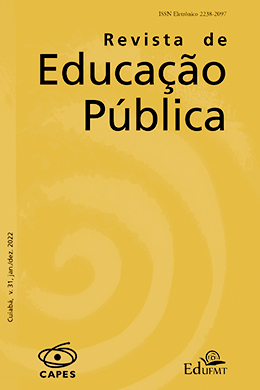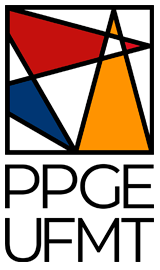Dialogues, tensions and inequalities in the process of implementing remote teaching inTremembé indigenous schoools
DOI:
https://doi.org/10.29286/rep.v31ijan/dez.12751Keywords:
Ensino remoto, Desigualdades, Escolas indígenas, Resistência TremembéAbstract
The article discusses inequalities in remote education in the context of COVID-19 from the case of indigenous schools in Tremembé villages located in the rural area of the municipalities of Acaraú and Itarema, Ceará, which adopted the strategy of delivering printed activities to students, considering the limitations of access to the means of virtual connection within the villages. The study is the result of documentary research in Decrees, Opinions and Guidelines issued by the government and in the reports of videoconferences carried out between representatives of the state education agency and the directors of indigenous schools. The analysis of the reports indicated the tension between indigenous directors and representatives of the state education agency regarding the directive issued by the State Department of Education for the adhesion of indigenous schools to the remote teaching strategy through the delivery of printed activities to Tremembé students. The indigenous directors resisted this strategy, presenting as an argument the fear of proliferation of the coronavirus in the villages during the delivery of activities to students. The adhesion of Tremembé schools to this model of remote learning was gradual between the months of March and May 2020, although there was no consensus among directors about this return. The records of the reports from the videoconferences with the Tremembé teachers indicated that, despite the fear of contamination by COVID-19, the understanding prevailed that the strategy of delivering printed activities contributed to the maintenance of links between Tremembé students and the school, mitigating the possibilities of cases of school dropouts and dropouts.
Downloads
References
ALMEIDA, A. M. F. A noção de capital cultural é útil para se pensar o Brasil? In Sociologia da Educação; pesquisa e realidade/ Lea Pinheiro Paixão, Nadir Zago (orgs.). 2 ed. – Petrópolis, RJ: Vozes, 2011 (Coleção Ciências Sociais da Educação).
BOURDIEU, P. Meditações Pascalianas. Tradução Sergio Miceli. Rio de Janeiro: Bertrand Brasil, 200l.
BOURDIEU, P. Escritos de Educação/ Maria Alice Nogueira e Afrânio Catani (organizadores). 12 ed. – Petrópolis, RJ: Vozes, 2011a.
BOURDIEU, P. Razões Práticas – Sobre a teoria da ação. Tradução: Mariza Corrêa – 11ª ed. – Campinas, SP: Papirus, 2011b.
BRASIL, Lei Darcy Ribeiro (1996) LDB nacional [recurso eletrônico]: Lei de diretrizes e bases da educação nacional: Lei nº 9.394, de 20 de dezembro de 1996, que estabelece as diretrizes e bases da educação nacional, - 11. ed. - Brasília: Câmara dos Deputados, Edições Câmara, 2015. - (Série Legislação; n. 159).
BRASIL, Lei nº 13.005, de 25 de junho de 2014. Aprova o Plano Nacional de Educação (PNE) e dá outras providências. Brasília: Diário Oficial [da] República Federativa do Brasil, Brasília, 26 jun. http: //www.planalto.gov.br/ccivil_03/_ato2011-2014/2014/lei/l13005.htm. Acesso em: 12 jul. 2021.
BRASIL, Instituto Brasileiro de Geografia e Estatística - IBGE. https://ftp.ibge.gov.br/Trabalho_e_Rendimento/Pesquisa_Nacional_por_Amostra_de_Domicilios_continua/Anual/Acesso_Internet_Televisao_e_Posse_Telefone_Movel_2018/Analise_dos_resultados_TIC_2018.pdf. Acesso em: 15 jan. 2021.
BRASIL Ministério da Educação, Conselho Nacional de Educação, Nota de Esclarecimento, 18 de março de 2020. Disponível em https://mec.gov.br. Acesso em: 22 dez. 2020.
BRASIL Medida Provisória nº 934, de 1º de abril de 2020. Estabelece normas excepcionais sobre o ano letivo da educação básica e do ensino superior decorrentes das medidas para enfrentamento da situação de emergência de saúde pública de que trata a Lei nº 13.979, de 6 de fevereiro de 2020. Diário Oficial da União, Brasília, DF, abr 2020. Disponível em: https://mec.gov.br. Acesso em: 28 dez. 2020.
BRASIL Parecer CNE n. 5/2020 , de 28 de abril de 2020. Reorganização do Calendário Escolar e da possibilidade de cômputo de atividades não presenciais para fins de cumprimento da carga horária mínima anual, em razão da Pandemia da COVID-19. Disponível em https://mec.gov.br. Acesso em: 10 dez. 2020.
CAPIBERIBE, A.., COVID-19: Um novo velho conhecido dos Indígenas in: Cientistas Sociais [recurso eletrônico] / Miriam Pillar Grossi e Rodrigo Toniol (organizadores). – 1. Ed – São Paulo: ANPOCS; Florianópolis: Tribo da Ilha, 2020.
CEARÁ, Decreto n. 33.510, de 16 de março de 2020. Decreta situação de emergência em saúde e dispõe sobre medidas para enfrentamento e contenção da infecção humana pelo novo coronavírus. Diário Oficial do Estado, Ceará. Disponível em: https://seplag.ce.gov.br. Acesso em: 15 dez 2020.
CEARÁ, Secretaria da Educação – SEDUC. Diretrizes para o período de suspensão das atividades educacionais presenciais por conta da situação de contenção da infecção humana pelo novo coronavírus no âmbito dos estabelecimentos de ensino da rede estadual do Ceará. Disponível em: https:// https://www.seduc.ce.gov.br/wp-content/uploads/sites/37/2020/03/Diretrizes_escolas.pdf .Acesso em: 18 dez 2020.
CEARÁ, Ofício SEDUC 07/2020 Disponível em: https://www.seduc.ce.gov.br/wp-content/uploads/sites/37/2020/03/oficio_circular.pdf. Acesso em: 01 jan 2021.
CEARÁ, Ofício SEDUC 08/2020. Disponível em https://www.seduc.ce.gov.br/wp-content/uploads/sites/37/2020/03/oficio_08_2020.pdf. Acesso em: 31 dez 2020.
CEARÁ, Portaria nº 0268/2020 13 de abril de 2020, Institui, em caráter emergencial e temporário, regime especial de trabalho para os servidores e colaboradores da secretaria da educação do estado do Ceará – SEUDC, como medida para a mitigação dos riscos decorrentes da doença causada pelo novo coronavírus (covid-19) e dá outras providências. Diário Oficial do Estado, Ceará. Disponível em https://seplag.ce.gov.br. Acesso em: 16 dez 2020.
COORDENADORIA REGIONAL DE DESENVOLVIMENTO DA EDUCAÇÃO – CREDE 3. Relatórios das Videoconferências com gestores indígenas, Acaraú: CREDE 3, Ceará, 2020.
IEDE & Instituto Rui Barbosa, junho 2020. A Educação Não Pode Esperar. https://irbcontas.org.br/wp-content/uploads/2020/06/Estudo-A-Educação-não-Pode-Esperar_diagramado.pdf
HABERMAS, J. A inclusão do outro: Estudos de teoria política. São Paulo: Loyola, 2002.
SECCHI, L. Políticas Públicas. Conceitos, esquemas de análise, casos práticos, - 2. Ed. – São Paulo: Cengage Learning, 2017.
VIANA, A. L. Abordagens metodológicas em políticas públicas. Revista de Administração Pública, v.30, n. 2, p. 5-43, mar./abri.1996.






















































